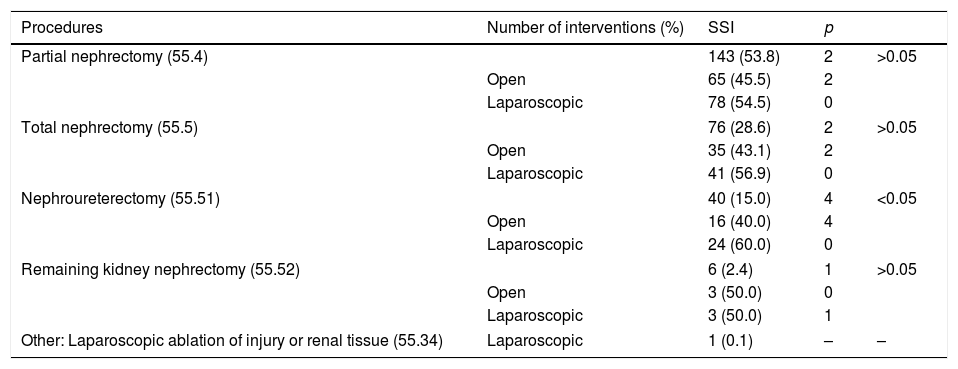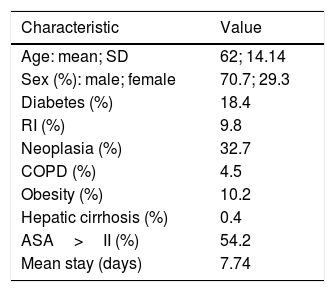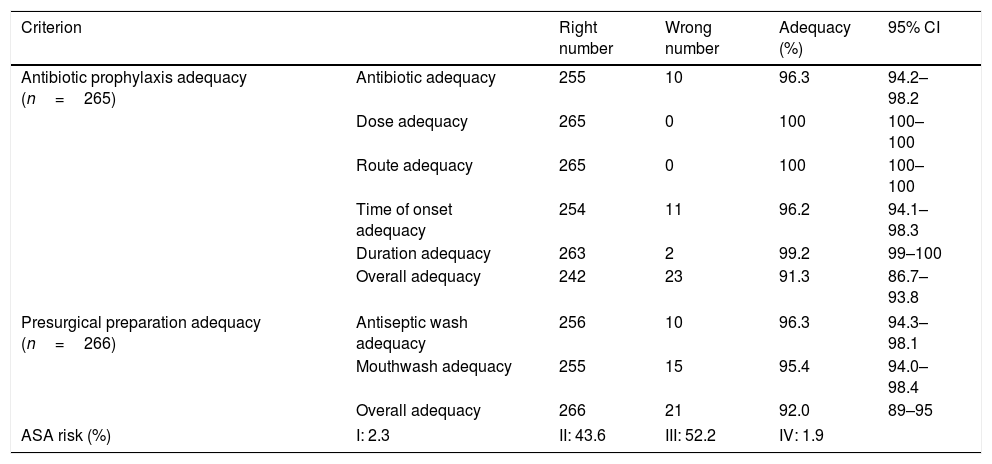To assess compliance with the antibiotic prophylaxis protocol for patients who underwent renal surgery and its effect on the incidence of surgical wound infection.
Material and methodsWe performed a prospective cohort study and assessed the overall compliance and each aspect of the antibiotic prophylaxis (start, administration route, antibiotic of choice, duration and dosage) and reported the compliance rates. The qualitative variables were compared with the chi-squared test, and the quantitative variables were compared with Student's t-test. We studied the effect of antibiotic prophylaxis compliance on the incidence of surgical wound infection in renal surgery, with the relative risk.
ResultsThe study included 266 patients, with an overall compliance rate of 90.6%. The major cause of noncompliance (3.8%) was the start of the prophylaxis, and the incidence rate of surgical wound infections was 3.4%. We found no relationship between antibiotic prophylaxis noncompliance and surgical wound infections (RR=0.26; 95% CI: 0.1–1.2; p>0.05). Laparoscopic surgery had a lower incidence of surgical wound infections than open surgery (RR=0.10; 95% CI: 0.01–0.79).
ConclusionsThe antibiotic prophylaxis compliance was high. The incidence of surgical site infection was low, and there was no relationship between the incidence of surgical site infection and antibiotic prophylaxis compliance. The incidence of infection was lower in laparoscopic surgery.
Evaluar la adecuación a protocolo de la profilaxis antibiótica en pacientes intervenidos de cirugía renal y su efecto en la incidencia de infección de localización quirúrgica.
Material y métodosSe realizó un estudio prospectivo de cohortes. Se evaluó la adecuación global y de cada apartado de la profilaxis antibiótica (inicio, vía de administración, antibiótico de elección, duración y dosis). Se describieron los porcentajes de adecuación. Las variables cualitativas se han comparado con la prueba χ2 y las cuantitativas con la prueba t-Student. Se ha estudiado el efecto de la adecuación de la profilaxis antibiótica, en la incidencia de infección de localización quirúrgica en la cirugía renal, con el riesgo relativo.
ResultadosSe incluyeron 266 pacientes en el estudio. La adecuación global fue del 90,6%. La mayor causa de inadecuación fue el inicio de la profilaxis, con un 3,8%. La incidencia de infección de localización quirúrgica fue del 3,4%. No se encontró relación entre la inadecuación de la profilaxis antibiótica y la infección de localización quirúrgica (RR=0,26; IC95%: 0,1-1,2; p>0,05). La cirugía laparoscópica tuvo menor incidencia de infección de localización quirúrgica que la cirugía abierta (RR=0,10; IC95%: 0,01-0,79).
ConclusionesLa adecuación de la profilaxis antibiótica fue alta. La incidencia de infección de localización quirúrgica fue baja y no hubo relación entre la incidencia de infección de localización quirúrgica y la adecuación a la profilaxis antibiótica. La incidencia de infección fue menor en la cirugía laparoscópica.










